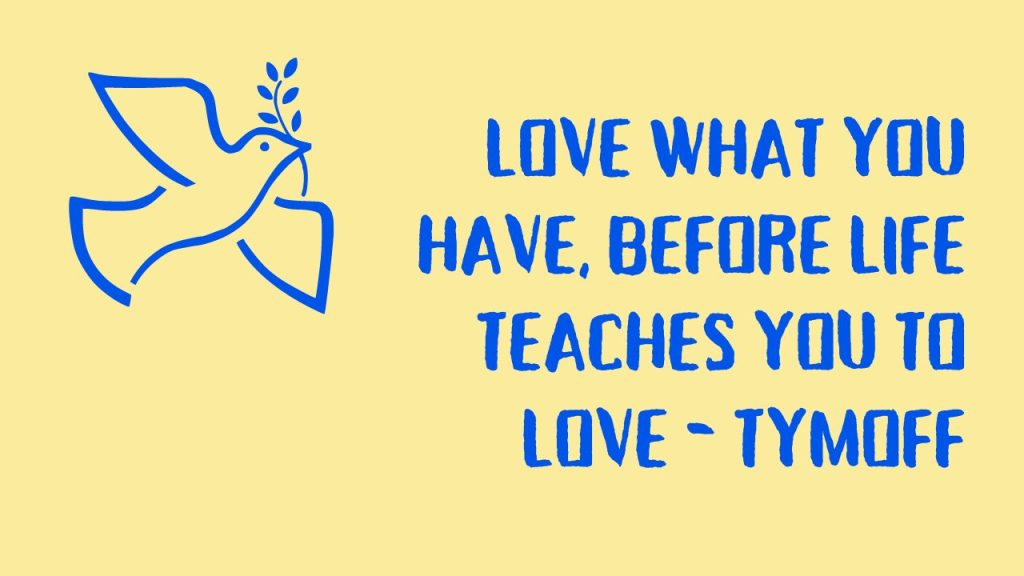In the hustle and bustle of modern life, it is all too easy to take for granted the many blessings we have. We often find ourselves yearning for more, constantly chasing after the next big thing, while neglecting to appreciate what is already in our possession. The phrase “Love what you have, before life teaches you to love” encapsulates a profound truth about the importance of gratitude and the inevitability of life’s lessons. This article delves into the significance of appreciating what we have, the consequences of neglecting gratitude, and practical ways to cultivate a mindset of thankfulness.
The Significance of Appreciating What You Have
The Nature of Human Desire
Human beings are inherently driven by desire. This drive can be a powerful motivator, pushing us to achieve our goals and improve our circumstances. However, unchecked desire can also lead to a perpetual state of dissatisfaction. When we focus solely on what we lack, we overlook the value of what we already possess. This constant yearning for more can create a cycle of unfulfilled longing, where happiness always seems just out of reach.
The Power of Gratitude
Gratitude is the antidote to this cycle of dissatisfaction. By consciously acknowledging and appreciating the good in our lives, we shift our focus from what we lack to what we have. Numerous studies have shown that practicing gratitude can lead to increased happiness, better mental health, and stronger relationships. When we love what we have, we cultivate a sense of contentment and fulfillment that enriches our lives.
The Consequences of Neglecting Gratitude
Emotional and Mental Strain
Neglecting to appreciate what we have can take a toll on our emotional and mental well-being. Constantly striving for more without acknowledging our current blessings can lead to feelings of inadequacy, anxiety, and depression. This relentless pursuit of unattainable goals can create a sense of emptiness and dissatisfaction, eroding our overall quality of life.
Strained Relationships
Our relationships can also suffer when we fail to appreciate what we have. Taking our loved ones for granted can lead to feelings of neglect and resentment. When we focus on what we perceive as lacking in our relationships, we overlook the positive aspects and the efforts of those around us. This can create a disconnect and weaken the bonds that hold us together.
Missed Opportunities for Joy
By not appreciating what we have, we miss out on countless opportunities for joy and fulfillment. The simple pleasures of life—the warmth of a loved one’s embrace, the beauty of a sunset, the satisfaction of a job well done—can be overlooked in our quest for more. These moments of joy are the building blocks of a meaningful and fulfilling life, and neglecting them can leave us feeling unfulfilled.
Life’s Lessons on Gratitude
The Wake-Up Call
Life has a way of teaching us the value of what we have, often through difficult and painful experiences. The loss of a loved one, a health crisis, or a significant setback can serve as a wake-up call, reminding us of the fragility and impermanence of life. These experiences can prompt us to reevaluate our priorities and appreciate the blessings we may have taken for granted.
The Wisdom of Experience
As we grow older and gain more life experience, we often develop a greater appreciation for what we have. The wisdom that comes with age teaches us to value the simple things and to cherish the moments that truly matter. This shift in perspective allows us to find contentment and joy in our everyday lives, rather than constantly seeking fulfillment elsewhere.
Cultivating a Mindset of Gratitude
Daily Gratitude Practice
One of the most effective ways to cultivate a mindset of gratitude is to establish a daily gratitude practice. This can be as simple as taking a few moments each day to reflect on the things you are thankful for. Keeping a gratitude journal, where you write down three things you are grateful for each day, can help reinforce this habit and shift your focus towards the positive aspects of your life.
Mindful Appreciation
Mindfulness is another powerful tool for cultivating gratitude. By being fully present in the moment and paying attention to the details of your surroundings, you can develop a deeper appreciation for the world around you. Whether it’s savoring the taste of your morning coffee, enjoying the feel of the sun on your skin, or listening to the laughter of your children, mindfulness allows you to experience and appreciate the richness of life.
Expressing Gratitude to Others
Expressing gratitude to others is a meaningful way to strengthen relationships and foster a sense of connection. Take the time to thank the people in your life for their kindness, support, and love. Whether it’s a heartfelt note, a verbal acknowledgment, or a small act of kindness, expressing gratitude can deepen your bonds and create a positive ripple effect.
Reframing Negative Experiences
Life is not without its challenges, and it’s easy to become consumed by negativity during difficult times. However, reframing negative experiences and finding the silver lining can help cultivate gratitude. Instead of focusing on what went wrong, try to identify what you learned from the experience or how it contributed to your growth. This shift in perspective can transform adversity into an opportunity for appreciation.
Conclusion
“Love what you have, before life teaches you to love” serves as a poignant reminder of the importance of gratitude and appreciation. By valuing what we have, we can cultivate a sense of contentment and fulfillment that enriches our lives and strengthens our relationships. Neglecting gratitude, on the other hand, can lead to emotional strain, strained relationships, and missed opportunities for joy. Life’s inevitable challenges often serve as wake-up calls, teaching us the value of our blessings. By practicing daily gratitude, mindful appreciation, expressing thanks to others, and reframing negative experiences, we can develop a mindset of gratitude that transforms our lives. In the end, loving what we have allows us to live more fully and joyfully, embracing the richness of each moment.



